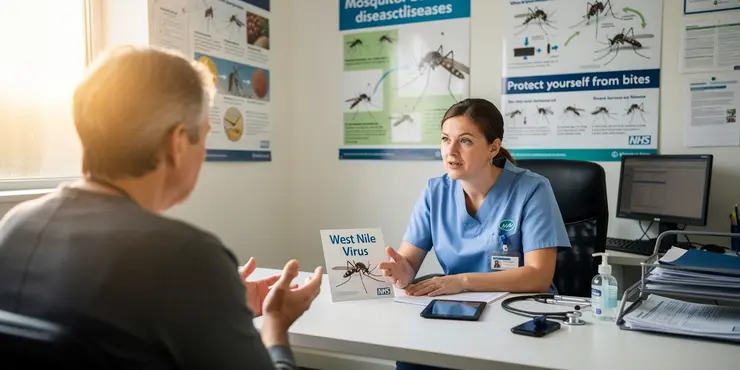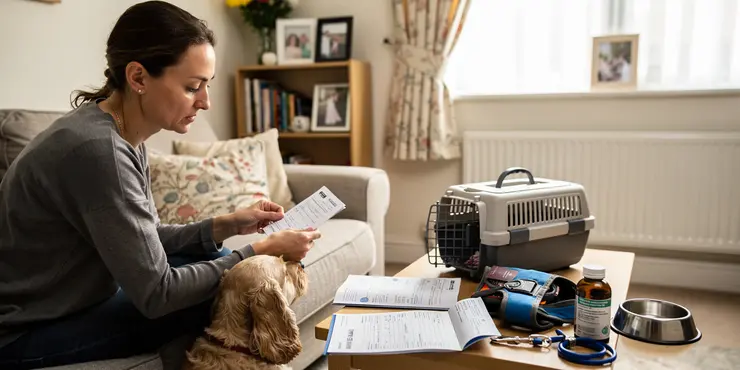
Find Help
More Items From Ergsy search
-

Can pets get West Nile Virus?
Relevance: 100%
-

What is West Nile Virus?
Relevance: 82%
-

Is there a vaccine for West Nile Virus?
Relevance: 81%
-

How is West Nile Virus transmitted?
Relevance: 80%
-

What is West Nile Virus?
Relevance: 80%
-

How prevalent is West Nile virus in the UK?
Relevance: 80%
-

Are there treatments for West Nile Virus?
Relevance: 79%
-

Is there a test for West Nile Virus?
Relevance: 79%
-

What are the symptoms of West Nile Virus?
Relevance: 77%
-

Which countries are affected by West Nile Virus?
Relevance: 76%
-

What should I do if I think I have West Nile Virus?
Relevance: 74%
-

How do health officials monitor West Nile Virus?
Relevance: 71%
-

Who is at risk for severe illness from West Nile Virus?
Relevance: 70%
-

How can West Nile Virus be prevented?
Relevance: 54%
-

Can mosquitoes carrying West Nile Virus be controlled?
Relevance: 50%
-

Can you get West Nile Virus more than once?
Relevance: 47%
-

What other viruses are tested for in blood donations?
Relevance: 40%
-

Are UK mosquitoes capable of transmitting Zika virus?
Relevance: 34%
-

What diseases are spread by mosquitos in the UK in 2025?
Relevance: 33%
-

When is West Nile Virus most active?
Relevance: 32%
-

Can West Nile Virus be transmitted from person to person?
Relevance: 28%
-

Is the Marburg virus related to the Ebola virus?
Relevance: 28%
-

Are there first aid courses for pets?
Relevance: 27%
-

Do UK spiders pose a threat to pets?
Relevance: 27%
-

Do pets contribute to hay fever?
Relevance: 27%
-

Can I keep a spider in the UK as a pet?
Relevance: 27%
-

What is the Ebola virus?
Relevance: 26%
-

Can pets get Lyme disease?
Relevance: 26%
-

Can pets damage mosquito screens?
Relevance: 26%
-

Can West Nile Virus spread through blood transfusions or organ transplants?
Relevance: 25%
-

The FDG PET Scan: What to expect
Relevance: 25%
-

Can I bring my pet to France or Spain from the UK?
Relevance: 25%
-

Are there any special precautions for pets during a heatwave?
Relevance: 25%
-
Do all mosquitoes in the UK carry diseases?
Relevance: 25%
-

What changes affect pet policies in rented homes?
Relevance: 24%
-

Can pets get scabies from humans?
Relevance: 24%
-

Your PET/CT scan at University College Hospital
Relevance: 24%
-

How can I ensure pets are safe during a heatwave?
Relevance: 24%
-

What regions of the UK are most affected by mosquito-borne diseases?
Relevance: 22%
-

Is there a cure for Nipah Virus?
Relevance: 20%
Understanding West Nile Virus
West Nile Virus (WNV) is a viral infection primarily transmitted by mosquitoes. It affects birds, humans, and some animals, causing flu-like symptoms. While WNV is prevalent in many parts of the world, it is relatively rare in the UK, where surveillance programs monitor its presence. Pets, especially dogs and cats, can occasionally contract the virus, though it is an uncommon occurrence.
How Pets Can Catch West Nile Virus
Pets can be exposed to West Nile Virus primarily through mosquito bites. Cats and dogs are generally considered resistant to the virus, and instances of severe illness are rare. Insects serve as vectors, spreading the virus from infected birds to other animals and humans. The likelihood of pets contracting WNV in the UK is low due to the absence of the virus in the local mosquito population. Additionally, pets that are kept indoors or in controlled environments have reduced exposure to potential carriers, further lowering risk.
Symptoms of West Nile Virus in Pets
Most pets infected with West Nile Virus do not show noticeable symptoms. However, in rare cases, animals may exhibit signs such as fever, lethargy, loss of appetite, and mild neurological issues. Dogs and cats that present these symptoms after mosquito bites should be evaluated by a veterinarian. In horses, which are more susceptible to WNV, symptoms can be more severe, including neurological problems such as incoordination and weakness.
Prevention Measures for Pet Owners
The best way to protect pets from West Nile Virus is through prevention. Reducing mosquito exposure is critical. Pet owners are encouraged to keep pets indoors during peak mosquito activity times, typically at dawn and dusk. Installing screens on windows and using mosquito repellents approved for animals can help. Additionally, eliminating standing water where mosquitoes breed, such as in birdbaths or ponds, is essential.
Treatment and Prognosis
If a pet contracts West Nile Virus, treatment options are mostly supportive, focusing on alleviating symptoms and providing comfort. There is no specific antiviral treatment available for WNV in animals. Most pets recover without complications, especially if the infection is mild. Veterinarians play a crucial role in diagnosing and managing the condition and should be consulted if WNV is suspected.
Conclusion
The risk of pets contracting West Nile Virus in the UK is minimal. By understanding the symptoms and taking preventive measures, pet owners can further protect their animals. Awareness and proactive measures are key to minimizing any potential health impacts of WNV on pets. Monitoring the presence of the virus remains important for ensuring the continued safety of pets and people alike.
Understanding West Nile Virus
West Nile Virus (WNV) is a sickness caused by a virus. Mosquitoes spread this virus. It can make birds, people, and some animals feel like they have the flu. WNV is found in many countries, but it is not common in the UK. In the UK, experts check for WNV. Dogs and cats can get this virus, but it's rare.
How Pets Can Catch West Nile Virus
Pets can get West Nile Virus from mosquito bites. Dogs and cats usually do not get very sick from it. Mosquitoes carry the virus from sick birds to other animals and people. In the UK, the chance of pets getting WNV is low because the local mosquitoes don't have it. Pets that stay indoors are safer because they meet fewer mosquitoes.
Symptoms of West Nile Virus in Pets
Most pets with West Nile Virus do not look sick. Sometimes, they might have a fever, feel tired, not want to eat, or have trouble moving. If your dog or cat shows these signs after being bitten by mosquitoes, take them to the vet. Horses can get sicker with symptoms like trouble moving or feeling weak.
Prevention Measures for Pet Owners
The best way to keep pets safe from West Nile Virus is to stop mosquito bites. Keep pets inside when mosquitoes are active, like early morning and evening. Use screens on windows and mosquito sprays that are safe for pets. Remove still water where mosquitoes might live, like in birdbaths or ponds.
Treatment and Prognosis
If a pet gets West Nile Virus, vets focus on making the pet comfortable. There is no special medicine to cure WNV in animals. Most pets get better on their own, especially if they are not very sick. Vets can help you understand what to do if you think your pet has WNV.
Conclusion
In the UK, pets are not very likely to get West Nile Virus. Knowing the signs of WNV and how to prevent it helps keep pets safe. Being careful and aware helps protect pets and people from the virus. Checking for the virus is important to keep everyone safe.
Frequently Asked Questions
Can pets get West Nile Virus?
Most pets, including dogs and cats, are unlikely to get West Nile Virus.
Are dogs at risk of West Nile Virus?
Dogs can become infected with West Nile Virus, but they typically do not show symptoms and are at low risk.
Can cats contract West Nile Virus?
Cats are also unlikely to show symptoms if they contract West Nile Virus and are at low risk.
How is West Nile Virus transmitted to pets?
West Nile Virus is mainly transmitted to animals through mosquito bites.
What are the symptoms of West Nile Virus in pets?
Most pets do not show symptoms, but if they do, symptoms may include fever, lethargy, or difficulty walking.
Should I worry about my pet getting West Nile Virus?
While it's always good to be cautious, most pets are at low risk of serious illness from West Nile Virus.
Can West Nile Virus be transmitted from pets to humans?
There is no evidence that pets can transmit West Nile Virus to humans.
Is there a vaccine for West Nile Virus for pets?
There is currently no vaccine for West Nile Virus for pets like dogs and cats.
How can I protect my pets from West Nile Virus?
You can protect pets by reducing their exposure to mosquitoes, such as avoiding peak mosquito hours and using pet-safe repellents.
Are horses at risk of West Nile Virus?
Horses are at higher risk and can show serious symptoms. Vaccination is recommended for horses.
Can birds get West Nile Virus?
Yes, birds can be infected, and some species are very susceptible to the virus.
What are the most susceptible animals to West Nile Virus?
Birds and horses are generally more susceptible to West Nile Virus than dogs and cats.
What should I do if I suspect my pet has West Nile Virus?
Contact a veterinarian if you suspect your pet is showing symptoms of West Nile Virus.
Can rodents get West Nile Virus?
Rodents can become infected but typically do not show symptoms of West Nile Virus.
Are any pet-specific treatments available for West Nile Virus?
There is no specific treatment for pets with West Nile Virus; care is supportive.
Do indoor pets like cats require any special precautions against West Nile Virus?
Indoor pets are at lower risk, but minimizing mosquito presence indoors can help protect them.
Can reptiles and amphibians get West Nile Virus?
There is limited evidence, but reptiles and amphibians are not commonly affected by West Nile Virus.
Are farm animals other than horses affected by West Nile Virus?
Farm animals like cattle and pigs are less susceptible compared to horses.
How common is West Nile Virus in small pets like ferrets?
West Nile Virus is not commonly reported in small pets like ferrets.
Can exotic pets like monkeys catch West Nile Virus?
Some exotic pets may be susceptible, but it's best to consult a vet for specific species risks.
Can pets get West Nile Virus?
Can my pet, like a dog or cat, get West Nile Virus?
West Nile Virus is a sickness from mosquitoes. It mostly affects birds and sometimes people.
Dogs and cats do not get very sick from this virus. They might get a little sick but usually feel better soon.
To help your pet stay safe, keep them indoors at night and away from mosquitoes. Use pet-safe mosquito repellent too.
If you are worried about your pet, talk to your vet. Your vet can help you and your pet.
Most pets, like dogs and cats, probably will not get West Nile Virus.
Can dogs get sick from West Nile Virus?
West Nile Virus is a disease that mosquitoes can carry. Sometimes it makes people sick.
But dogs do not usually get sick from it. Most dogs are safe.
If you are worried about your dog, talk to a vet. A vet is an animal doctor.
To help keep mosquitoes away, you can:
- Keep your dog inside at night.
- Use mosquito spray for pets.
- Ask a vet for advice.
Dogs can catch West Nile Virus. But, they usually do not get sick. They are not in much danger from it.
Can cats get West Nile Virus?
West Nile Virus is a sickness spread by mosquitoes.
It's mostly found in birds.
Cats don't often get this virus.
If you worry about your cat and West Nile Virus, ask your vet.
Tools to help understand:
- Use simple words.
- Ask someone to read with you.
- Look at pictures of mosquitoes and cats.
Cats usually do not get sick if they catch West Nile Virus. They are not in much danger from it.
How do pets catch West Nile Virus?
West Nile Virus is a sickness. Pets can catch it.
Mosquitoes can carry the virus. When a mosquito bites a pet, it can spread the virus.
To help protect pets, you can:
- Keep them away from mosquitoes.
- Use pet-safe mosquito repellents.
- Keep pets inside when there are lots of mosquitoes outside.
West Nile Virus spreads to animals when mosquitoes bite them.
What signs show if my pet is sick with West Nile Virus?
Here is how you can tell if your pet might be sick with West Nile Virus:
- Your pet might feel very tired and not want to play.
- Your pet could have a fever. This means they feel very warm.
- Your pet might walk funny or seem wobbly.
- They may not eat or drink like normal.
- Sometimes pets get a stiff neck or have trouble moving.
If you think your pet is sick, ask a grown-up to help you call the vet. They know how to help and keep your pet safe.
Most pets do not show signs of being sick. But if they do, they might have a fever, feel very tired, or have trouble walking.
Should I be scared about my pet getting West Nile Virus?
No, you don’t need to worry too much. It’s rare for pets to get sick from West Nile Virus. Most pets stay healthy.
It’s a good idea to keep mosquitoes away from your pets. You can use pet-safe mosquito repellent or keep them indoors during times when mosquitoes are out the most, like early morning and evening.
If you are worried, talk to your vet. They can give you advice to keep your pet safe.
It's good to be careful, but most pets are not likely to get very sick from West Nile Virus.
Can Pets Give Humans West Nile Virus?
Can a pet make a person sick with West Nile Virus?
No, pets cannot give West Nile Virus to people.
If you have questions, ask a doctor or a vet.
Pictograms can help understand better.
Pets cannot give people West Nile Virus. There is no proof that this can happen.
Can my pet get a shot to stop West Nile Virus?
Right now, there is no shot to stop West Nile Virus in pets like dogs and cats.
How can I keep my pets safe from West Nile Virus?
West Nile Virus can make pets sick. Here are some ways to keep them safe:
- Keep your pets indoors during early morning and evening when mosquitoes are out.
- Put screens on windows and doors to stop mosquitoes from coming inside.
- Use pet-safe mosquito repellent if they are going outside.
- Clean up any standing water where mosquitoes like to lay eggs.
If you are worried, talk to your vet. They can give you more advice.
Support tools:
- You can use apps or ask someone to read these tips out loud.
You can keep your pets safe from mosquitoes. Try to stay away from mosquitoes when they are most active. You can also use bug spray that is safe for pets.
Can horses get sick from West Nile Virus?
Horses can sometimes get sick from a virus called West Nile Virus. This virus comes from mosquito bites.
How can we help our horses?
- Keep your horse away from mosquitos. Use nets or sprays to protect them.
- Ask your vet about vaccines to help stop the virus.
- Check your horse often for signs of sickness, like fever or not eating.
If you use these tips, you can help keep your horse safe from the virus.
Horses can get very sick. It is important to give them special medicine called a vaccine to keep them safe.
Can birds get West Nile Virus?
Yes, birds can get West Nile Virus. This is a sickness that birds can catch from mosquito bites. If a bird has West Nile Virus, it might get sick or even die.
To make it easier to understand:
- Use simple words.
- Read with a helper if you need.
- Look at pictures of birds and mosquitoes to learn what they are.
If you want to learn more, ask a grown-up to help you find out.
Yes, birds can get sick from the virus. Some kinds of birds get very sick easily.
Which animals get sick from West Nile Virus the most?
Birds and horses can get sick from West Nile Virus more easily than dogs and cats.
What to do if you think your pet has West Nile Virus?
If you think your pet is sick with West Nile Virus, follow these steps:
- Take your pet to the vet. The vet can help your pet feel better.
- Keep your pet away from other animals while they are sick.
- Make sure your pet drinks water and rests.
- Wash your hands after touching your pet.
If you need help, ask a friend or family member. You can also use a picture board or app to help understand how to care for your pet.
If you think your pet is sick with West Nile Virus, call an animal doctor for help.
Can rodents get West Nile Virus?
Do mice and rats get sick from West Nile Virus?
Rodents like mice and rats can carry many germs. Some germs make them sick, and some don’t. Scientists check to see if they get sick from West Nile Virus.
If you want more help reading, you can use tools that read the words out loud. You can also ask someone to help you understand the words.
Rats and mice can get the West Nile Virus, but they usually do not get sick from it.
Can pets get special treatments for West Nile Virus?
There is no special medicine for pets with West Nile Virus. We can help them by taking good care of them.
Do indoor pets like cats need to be protected from West Nile Virus?
West Nile Virus is mostly spread by mosquitoes. Indoor cats are usually safe because they are inside. But it is still good to keep mosquitoes out of your home.
Here are some simple ways to protect your cat:
- Make sure windows and doors are closed or have screens.
- Use a fan or air conditioning to keep mosquitoes away.
- Check for mosquitoes when you open doors.
If you have questions, ask a vet. They can help you keep your cat safe.
Pets that stay inside are safer. But it is good to keep mosquitoes away from your home to protect them.
Can reptiles and amphibians get West Nile Virus?
West Nile Virus is a sickness. It mainly affects birds and some animals.
Reptiles are animals like snakes and lizards.
Amphibians are animals like frogs and toads.
Scientists are still studying if reptiles and amphibians can get West Nile Virus.
People can use books or videos to learn more about animals and viruses.
There isn't much proof, but reptiles and amphibians usually do not get sick from West Nile Virus.
Can farm animals like cows or pigs get West Nile Virus?
West Nile Virus is a sickness. Horses can get it, but what about other farm animals? Let’s find out if animals like cows and pigs can get sick too.
If you're having trouble understanding, it's okay to ask someone for help or look at pictures about farm animals and the virus.
Farm animals like cows and pigs are less likely to get sick compared to horses.
Do small pets like ferrets often get West Nile Virus?
West Nile Virus does not often happen in small pets like ferrets.
Can pets like monkeys get West Nile Virus?
Some animals, like monkeys, can get sick from a virus called West Nile Virus. This virus is usually spread by mosquitoes. It's important to keep your pet safe from mosquito bites.
You can use tools like mosquito nets or sprays to protect your pets. If you're worried, talk to a vet for more advice.
Some unusual pets might get sick. It's a good idea to ask a vet to find out if your pet is okay.
Useful Links
This website offers general information and is not a substitute for professional advice.
Always seek guidance from qualified professionals.
If you have any medical concerns or need urgent help, contact a healthcare professional or emergency services immediately.
Some of this content was generated with AI assistance. We’ve done our best to keep it accurate, helpful, and human-friendly.
- Ergsy carfully checks the information in the videos we provide here.
- Videos shown by Youtube after a video has completed, have NOT been reviewed by ERGSY.
- To view, click the arrow in centre of video.
- Most of the videos you find here will have subtitles and/or closed captions available.
- You may need to turn these on, and choose your preferred language.
- Go to the video you'd like to watch.
- If closed captions (CC) are available, settings will be visible on the bottom right of the video player.
- To turn on Captions, click settings .
- To turn off Captions, click settings again.
More Items From Ergsy search
-

Can pets get West Nile Virus?
Relevance: 100%
-

What is West Nile Virus?
Relevance: 82%
-

Is there a vaccine for West Nile Virus?
Relevance: 81%
-

How is West Nile Virus transmitted?
Relevance: 80%
-

What is West Nile Virus?
Relevance: 80%
-

How prevalent is West Nile virus in the UK?
Relevance: 80%
-

Are there treatments for West Nile Virus?
Relevance: 79%
-

Is there a test for West Nile Virus?
Relevance: 79%
-

What are the symptoms of West Nile Virus?
Relevance: 77%
-

Which countries are affected by West Nile Virus?
Relevance: 76%
-

What should I do if I think I have West Nile Virus?
Relevance: 74%
-

How do health officials monitor West Nile Virus?
Relevance: 71%
-

Who is at risk for severe illness from West Nile Virus?
Relevance: 70%
-

How can West Nile Virus be prevented?
Relevance: 54%
-

Can mosquitoes carrying West Nile Virus be controlled?
Relevance: 50%
-

Can you get West Nile Virus more than once?
Relevance: 47%
-

What other viruses are tested for in blood donations?
Relevance: 40%
-

Are UK mosquitoes capable of transmitting Zika virus?
Relevance: 34%
-

What diseases are spread by mosquitos in the UK in 2025?
Relevance: 33%
-

When is West Nile Virus most active?
Relevance: 32%
-

Can West Nile Virus be transmitted from person to person?
Relevance: 28%
-

Is the Marburg virus related to the Ebola virus?
Relevance: 28%
-

Are there first aid courses for pets?
Relevance: 27%
-

Do UK spiders pose a threat to pets?
Relevance: 27%
-

Do pets contribute to hay fever?
Relevance: 27%
-

Can I keep a spider in the UK as a pet?
Relevance: 27%
-

What is the Ebola virus?
Relevance: 26%
-

Can pets get Lyme disease?
Relevance: 26%
-

Can pets damage mosquito screens?
Relevance: 26%
-

Can West Nile Virus spread through blood transfusions or organ transplants?
Relevance: 25%
-

The FDG PET Scan: What to expect
Relevance: 25%
-

Can I bring my pet to France or Spain from the UK?
Relevance: 25%
-

Are there any special precautions for pets during a heatwave?
Relevance: 25%
-
Do all mosquitoes in the UK carry diseases?
Relevance: 25%
-

What changes affect pet policies in rented homes?
Relevance: 24%
-

Can pets get scabies from humans?
Relevance: 24%
-

Your PET/CT scan at University College Hospital
Relevance: 24%
-

How can I ensure pets are safe during a heatwave?
Relevance: 24%
-

What regions of the UK are most affected by mosquito-borne diseases?
Relevance: 22%
-

Is there a cure for Nipah Virus?
Relevance: 20%


